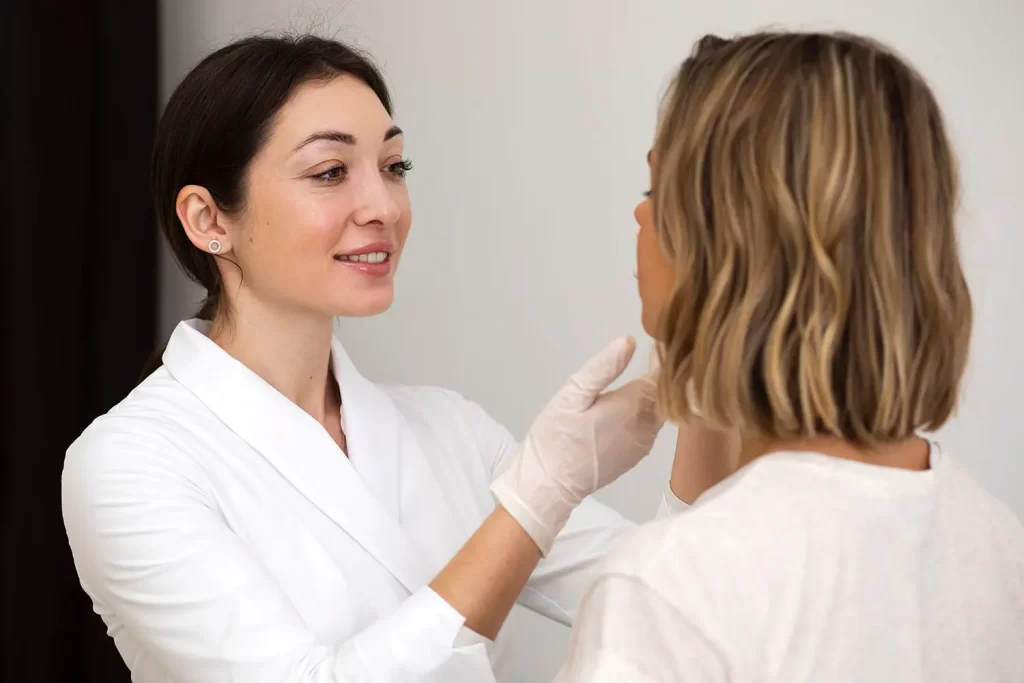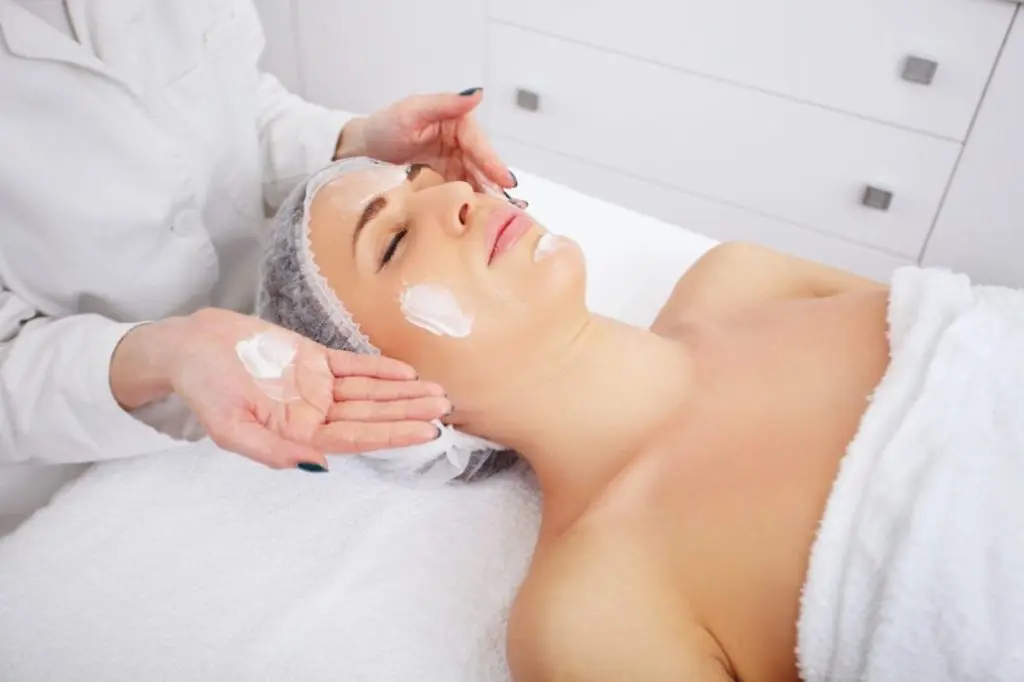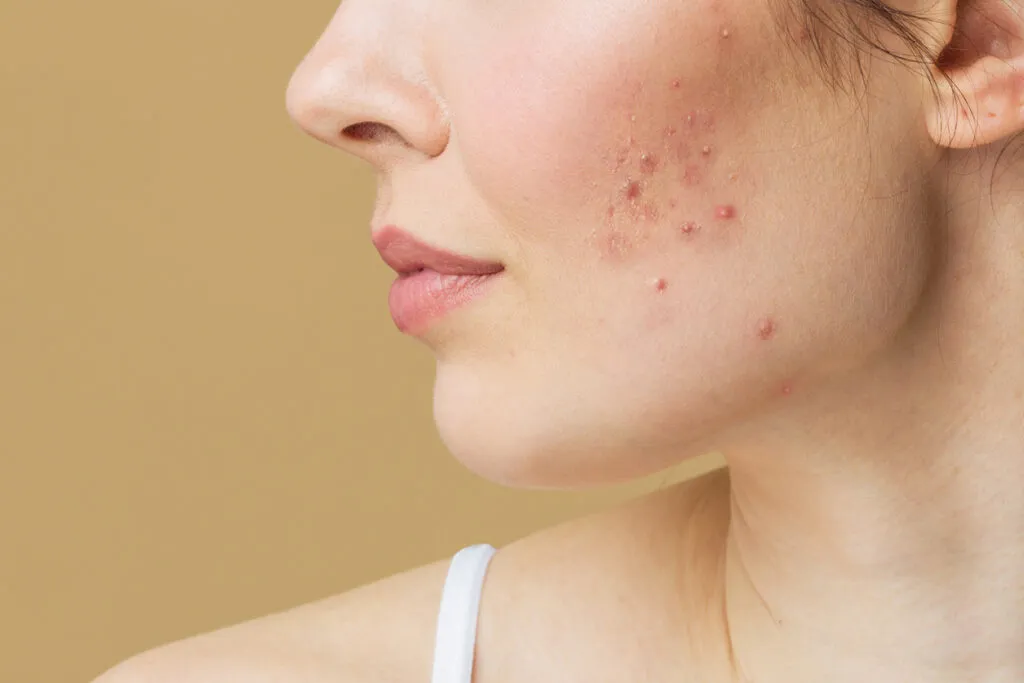The difference between a dermatologist and an esthetician comes down to training and what each can do for your skin. A dermatologist is a medical doctor who studies for about 12 years to diagnose and treat skin, hair, and nail problems.
An esthetician works on the surface of the skin, helping it look and feel better through facials and other cosmetic treatments.
Dermatologists can prescribe medication or perform medical procedures, while estheticians focus on skin care routines and prevention. Knowing who to see helps you achieve safe, effective results for your skin.
A healthy complexion starts with the right professional. At DermOnDemand, led by Dr. Alicia Atkins, a board-certified dermatologist with years of medical experience, patients receive expert care from real specialists.
This guide explains the differences between dermatologists and estheticians so you can make the best choice for your skin health.
Key Takeaways
- Dermatologists are medical doctors who complete medical school and board certification to diagnose and treat skin, hair, and nail conditions.
- Estheticians are skin care professionals trained to perform non-medical cosmetic treatments such as facials, exfoliation, and superficial chemical peels.
- The main difference between a dermatologist and an esthetician lies in their training, scope of practice, and ability to prescribe medication or perform medical procedures.
- You should see a dermatologist for conditions like acne, eczema, or skin cancer, and an esthetician for routine care, hydration, or improving skin texture.
- At DermOnDemand, led by Dr. Alicia Atkins, patients can access fast, private, and professional online dermatology consultations from board-certified experts within 24 hours.
What Is an Esthetician vs. a Dermatologist?
What Does an Esthetician Do?
An esthetician helps improve the appearance of your skin with cosmetic treatments such as facials, exfoliation, and superficial chemical peels. They work in spas, salons, and skin care clinics, giving treatments that refresh and smooth the skin.
While they are skilled skin care professionals, estheticians do not treat medical conditions. Their work focuses on comfort, maintenance, and appearance.
Training, Licensing, and Scope of Practice
To become an esthetician, a person needs a high school diploma and must complete a state-approved training program. The program covers skin types, anatomy, and care techniques.
Estheticians must pass a licensing exam before they can practice. They are not allowed to prescribe medication or perform medical treatments. Their goal is to help clients keep healthy skin through regular care.
Prescription Rights and Medical Expertise
A dermatologist is a medical doctor who finishes medical school, residency, and board certification from the American Board of Dermatology.
This training allows them to diagnose and treat skin diseases, perform surgeries, and create treatment plans. A dermatologist, a medical doctor who specializes in skin, has the skills to manage both common and serious problems.
Key Differences Between Dermatology and Esthetician Work

How Dermatologists Diagnose and Treat Skin Conditions
Dermatologists are trained to diagnose and treat many skin conditions, including acne, eczema, and skin cancer. They can take samples, perform biopsies, and give prescription medical treatments. Because dermatologists are medical doctors, they can identify deeper causes and provide long-term care to improve skin health.
What Estheticians Focus On in Skin Care
Estheticians work on the skin’s surface. They use tools and products that clean, exfoliate, and hydrate. These skin care specialists focus on texture, tone, and glow, not on medical issues. Their goal is to help clients maintain a healthy, bright look with simple, consistent care.
How Dermatologists and Estheticians Work Together
Dermatologists and estheticians often work as a team. An esthetician might notice a mole or rash and refer the client to a dermatologist. After medical treatment, a dermatologist may send the patient back to the esthetician for follow-up care. Together, they combine medical and cosmetic expertise to give complete skin care.
When to See a Dermatologist vs. an Esthetician
Esthetician vs. Dermatologist for Acne
If you have mild acne, an esthetician can help reduce oil and unclog pores through facials or light exfoliation. But if your acne is severe, painful, or leaves scars, see a dermatologist.
Since dermatologists are medical doctors, they can provide medical treatments such as prescription creams, antibiotics, or stronger therapies that treat acne from the inside out.
Dermatologist or Esthetician for Hyperpigmentation
For dark spots or uneven tone, estheticians can use superficial chemical peels or brightening facials. If spots are deep or hormone-related, a dermatologist can offer laser therapy or prescription creams. The best plan often includes both: the dermatologist for treatment and the esthetician for ongoing skin care.
Which Option Offers Better Skin Care Results?
Both professionals are important, depending on your needs. See an esthetician for routine care, hydration, or smoother skin. Visit a dermatologist when you need a diagnosis, medical treatments, or expert help for specific skin conditions. Choosing the right expert ensures safe, lasting results for your skin.
Expertise Levels and Credentials

What Is Higher Than an Esthetician?
A dermatologist’s education goes far beyond that of an esthetician. They attend medical school and complete clinical training, while estheticians take shorter courses. Both are licensed skin care professionals, but only dermatologists can handle medical conditions or perform surgery.
Board-Certified Dermatologists and Advanced Specialists
A board-certified dermatologist passes national exams from the American Board of Dermatology. This shows proven skill in treating and preventing skin diseases. Many dermatologists go on to specialize in cosmetic procedures, pediatric care, or skin surgery, giving patients safe, effective, and advanced care.
How Certification Impacts Care Quality
Seeing a board-certified dermatologist means you’re being treated by a medical doctor who specializes in skin. Certification ensures up-to-date knowledge, safety, and high medical standards. Patients can feel confident that their dermatologist uses modern science to improve results and protect their health.
How to Choose the Right Skin Expert
How to Find and Verify a Trusted Skin Expert
Start by knowing what you need. For relaxation or light maintenance, find a licensed esthetician. For medical issues, choose a dermatologist certified by the American Board of Dermatology. Always check reviews, licenses, and clinic credentials before booking an appointment.
Why Choose a Board-Certified Online Dermatologist
Using teledermatology through DermOnDemand connects you with board-certified dermatologists quickly and safely. Patients can share photos and details through a secure platform and get personalized treatment within a day. It’s ideal for people who want expert care without waiting weeks for an in-office visit.
Fast, Private, 24-Hour Virtual Consultations with DermOnDemand
At DermOnDemand, every case is reviewed by Dr. Alicia Atkins within 24 hours. Patients receive private, tailored treatment plans from board-certified experts who treat patients for conditions like acne, eczema, and skin cancer.
The process is fast, confidential, and designed for anyone who values expert help for better skin health.
In conclution
The difference between a dermatologist and an esthetician is clear: one is a doctor who can diagnose and treat skin diseases, and the other focuses on improving the look and feel of your skin.
Dermatologists are medical doctors with years of education and advanced skills, while estheticians work on non-medical treatments that support beauty and wellness.
Both can help your skin, but for safety and accuracy, always choose the right professional for your needs. With Dr. Alicia Atkins and the team at DermOnDemand, expert skin care is available whenever you need it.







